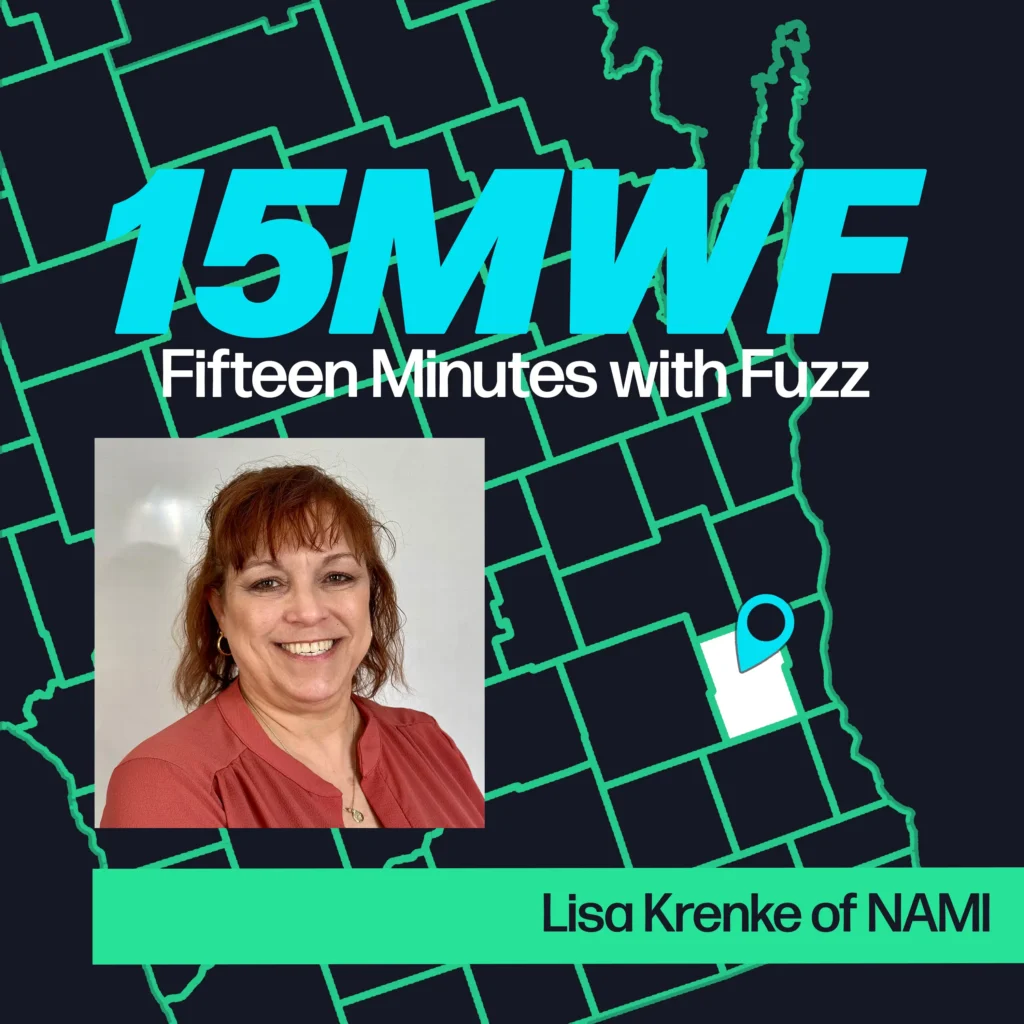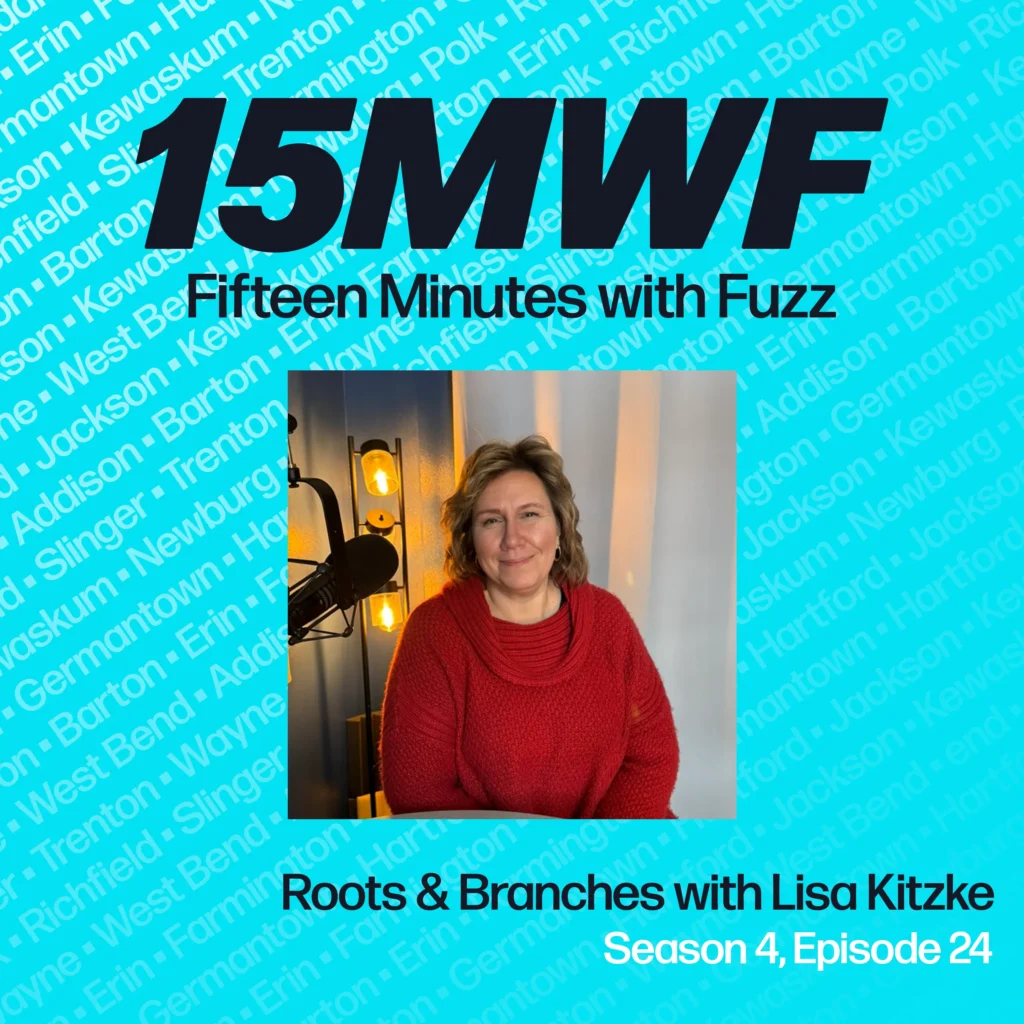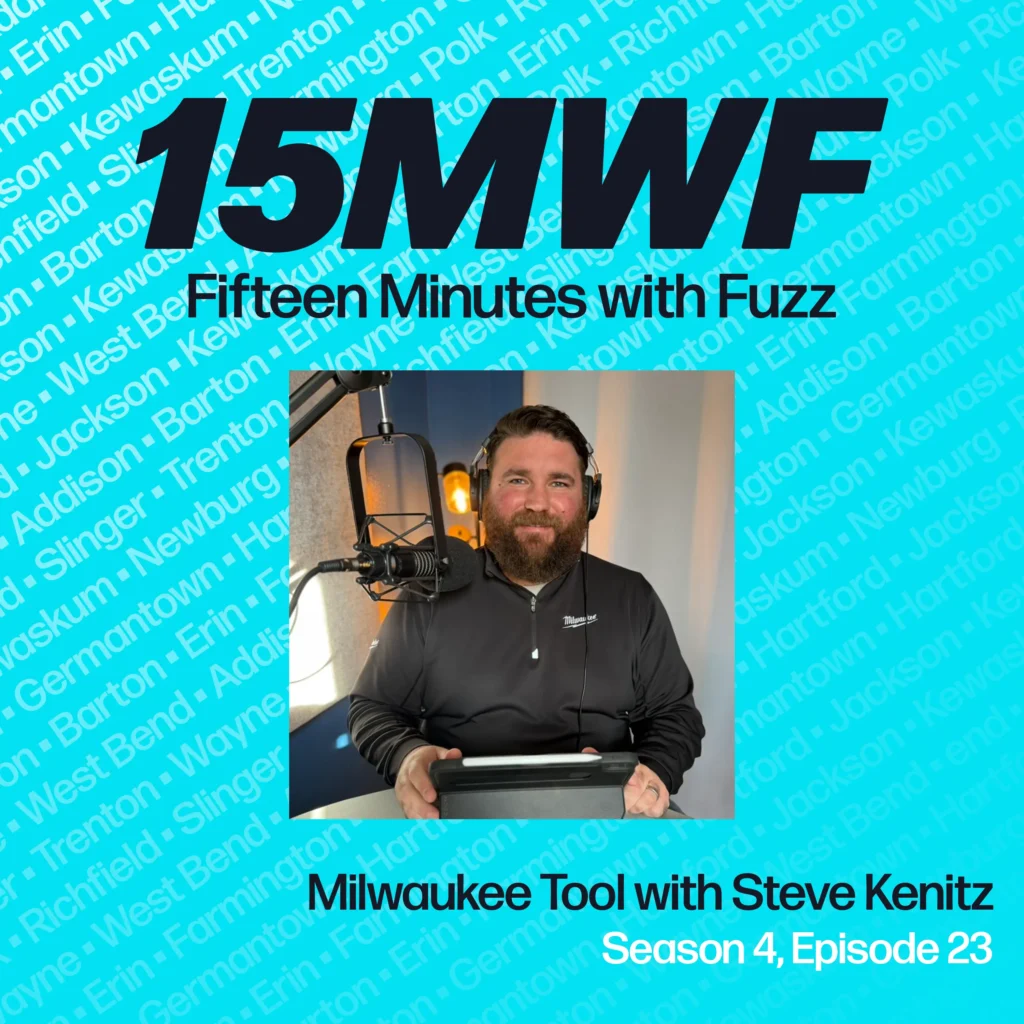In this week’s episode of Fifteen Minutes with Fuzz, I am joined by Lisa Krenke, the Executive Director of NAMI Washington County. Lisa shines a spotlight on Mental Health Awareness Month, candidly addressing the lingering stigmas associated with mental health issues and the crucial role we all play in dismantling them. She also provides details about their upcoming Adrenaline Race fundraiser, an exciting event designed to promote mental health advocacy and substance use disorder and support the ongoing efforts of NAMI Washington County and ELEVATE, Inc.

Fifteen Minutes with Fuzz
A podcast about positive things happening in and around Washington County, Wisconsin
Mental Health Awareness Month with Lisa Krenke of NAMI Washington County
Transcript
(click to expand)Fuzz Martin 0:00
Oh thank you for listening to Fifteen Minutes with Fuzz. My name is Fuzz Martin and this is a show about all of the positive things happening in and around Washington County, Wisconsin. On this episode I speak with Lisa Krenke, Executive Director of Nami, which is the National Alliance on Mental Illness. Here in Washington County, May is Mental Health Awareness Month and Lisa joins us to talk about what’s going on during the month, and how you can support friends and loved ones who are struggling with mental health issues or find resources for yourself if you need them. With that, here are 15 minutes on Mental Health Awareness Month with Lisa Krenke of NAMI Washington County right here on Fifteen Minutes with Fuzz.Fuzz Martin 0:59
Welcome to Fifteen Minutes with Fuzz. Lisa, can you please introduce yourself and tell us a bit about your role as the executive director at NAMI of Washington County?Lisa Krenke 1:07
Absolutely. Thank you so much for having us on fuzz. My name is Lisa Krenke. And as I said, I’m the executive director for NAMI, Washington County. We are a nonprofit organization that provides peer support for individuals, adults and teens and their families who are affected by mental illness.Fuzz Martin 1:28
So May is Mental Health Awareness Month, can you tell us about its significance and the importance of raising awareness about mental health issues here in Washington County?Lisa Krenke 1:39
Yes, mental health awareness month was actually established in 1949. And it was established in order to eliminate the stigma around mental illness. And unfortunately, we still have mental health awareness month because the stigma is still around and is decreasing. But a lot of people still feel that individuals living with a mental health condition are violent, or they need to be put away in a hospital or that they are at fault for what’s going on in their life.Fuzz Martin 2:12
You’ve talked about some of those misconceptions about mental health. Are there others that you’d like to address? I know, people are more I feel like, you know I grew up in was born in 78. I grew up in the 80s and 90s. And a lot of times he didn’t talk about mental health stuff, but I feel like now like even an 18 year old, and their friends are very open about those things. Are you seeing that coming around. AndLisa Krenke 2:34
even in the last five years, since I’ve really been working in the mental health field, I feel like there is a greater awareness and acceptance of those living with mental illnesses or mental health conditions. And that people are more willing to take time to listen and understand what’s going on, rather than just making a judgement about that person.Fuzz Martin 2:55
Sure. And I do feel that at least like in the circles that I’m in, and maybe it’s not probably the same everywhere, but somebody’s not afraid to say I have an hour off. I’m going to see my therapist, and then things like that. I feel like that’s more talked about these days than it used to be.Lisa Krenke 3:12
It absolutely is. I mean, I have no problem sharing with people that I live with anxiety, depression and PTSD. Some people look at me like, oh, that’s kind of scary. And other people are just like, oh, okay, well, what’s going on in your life? How’s your dog? So? I think it just depends. Definitely, within the school systems, mental health conditions are very accepted. And we find at the teenage level, talking about it is no, not a big deal to them at all.Fuzz Martin 3:40
Right. And I think part of helping with that is being able to hiding it, I’m sure only amplifies some of those anxieties and things as well. Absolutely. In your experience, what are some of the biggest challenges that individuals struggling with mental health issues still face here in Washington County,Lisa Krenke 3:57
I think the biggest issue right now in Washington County is that there are only two psychiatrists in the county. And there are three licensed psychiatry nurses. Other than that, there are no other outside of a family doctor who can prescribe actual mental health prescriptions. And then also, there’s about an eight month wait to get into see a mental health professional right now in our county. And that’s huge. The other thing is that right now, the National statistic for the first time someone has a symptom of a mental health condition, and they actually receive a treatment for is 11 years. Oh, wow. Okay, a lot of times their first diagnosis won’t be their last diagnosis, and it may not be even be close.Fuzz Martin 4:46
Okay. And do you is that number coming down at least? Is that shrinking or is it getting better? Or do you think it’s,Lisa Krenke 4:54
I would, well, that’s the most current that I’ve seen. Okay. I would have to say it’s because people are becoming more aware of it, and I think parents are looking to, you know, school personnel or their family doctors or pediatricians, when they are concerned about their child, I would hope that it’s, you know, shrinking in time, but I think it’s going to take a long time to eliminate that gap. Oh, yeah. Just because the stigma is still out there. And, you know, my parents, if they would have seen it in me, they would have been like, oh, no, there’s nothing wrong, right. And I think the younger parents now because it’s become more prevalent and easier to talk about, I’m hoping that they’ll get their children and their teens in to see professionals quicker.Fuzz Martin 5:40
Yeah, and those who now, you know, are open and talking about like, the teens these days, when they become parents and grow up, then it’ll be easier. They’re not going to hide it like, alright, you know, baby boomer grandparents or parents did back in the day, because there was that stigma, right? Absolutely. So could you share a success story or a moment that in your role here at NAMI that is particularly impacted you in your work with Washington County,Lisa Krenke 6:10
there’s a woman that I’m very close to, she started coming to Nami five years ago, pretty quickly after I started. And she would come in the front door, her head down, sign her name, walk directly into the arts and crafts room, not speaking to anyone sit down off on a chair, pretty much by herself and quietly do her craft and get up and leave not not speaking to anyone. And as she grew more confident, and we talked to her more, and she felt more comfortable in our space, she became a leader in our organization. So right now she leads three arts and crafts groups a week. And that’s for adults living with mental illness just like herself. So she’s become a peer leader. And people depend on her people call her for advice, and they call her for suggestions when they’re struggling. And she’s just a joy. She just is smiley and bubbly and just doing amazing things.Fuzz Martin 7:09
Right. It’s a wonderful story. And it’s, it’s good to hear those successes. And that’s, those are the kinds of things that Nami exists for, right to help people get through that.Lisa Krenke 7:19
Yes, absolutely. One of the things that’s unique about Nami is that we don’t have any mental health professionals on staff. We provide all peer support. So any of our support groups or education classes, any of the outreach that we do, it’s all done by individuals who are either living with a mental illness or health condition, or have taken care of someone or are taking someone with a mental health condition.Fuzz Martin 7:43
When did Nami come about here in Washington County? Well,Lisa Krenke 7:46
NAMI was first formed in Washington County in 1999. Okay, it was a idea brought forth by three women who were working with the county that was helping their loved ones. And they really started to think about how are their loved ones going to socialize? And how are their loved ones going to meet other individuals like themselves? So they started NAMI, and then in 2020, excuse me, 2001, they received their first state grant. So we are now one of the 11 peer recovery centers in the state of Wisconsin.Fuzz Martin 8:17
Oh, very good. Very good. So we talked about peers and getting help with a place like Nami, how can you as a family member or a friend support a loved one that’s dealing with a mental health issue? Are there specific resources or techniques or things to do or not do when you recognizeLisa Krenke 8:36
it, I hesitate to say there’s anything you should or shouldn’t do when helping someone with a mental health condition. Because everyone is different. It affects everyone differently. I think learning about the type of illness or condition that the individual has, learning about the treatment options that are out there, seeking support for yourself. When you’re caring for someone with a mental illness, it’s very easy to feel guilty, and feel overwhelmed. So seeking support for yourself. So we have a family support group that we meet once a month. And then we also offer a Family to Family Education class, which is an eight week session. And it really goes deeply into research that’s out there and how trauma and mental illness affects your brain and different things like that crisis management,Fuzz Martin 9:26
what other types of programming like that do you have at Nami, they assume that you have a number of differentLisa Krenke 9:31
Yeah, so we actually have programs that are evidence based and then programs that are not evidence based. We do go into all of the public high school and middle school health classes each year and we do our ending the silence program, which is an awareness program about mental health, as well as suicide and then on the second day of the program, one of our young adults comes in and shares their journey about mental illness with the students And then we’ll answer questions from the students. And I think that’s where we are having the biggest impact. We sink about 1,800 students a year. And I think seeing them and then having them go home with those resources in those lessons really is what’s making a difference in our society. As far as stigma goes, we do adult support groups, peer led adult support groups, we have a young adult support group, and they meet in our center three times a month, and then on that fourth month, they go out into the community on do community activities and things like that. Everything that we do at NAMI is free. We also recently started partnering with the sole source here in West Bend, and are now able to offer art therapy classes for adult with adults with mental health conditions.Fuzz Martin 10:46
Oh, wow, that’s really awesome. How do you get involved if somebody wants to learn about NAMI or they haven’t heard about Nami yet, and they want to learn more, what’s the best placeLisa Krenke 10:55
they can go to our website is probably the easiest way to find us. And that’s www.NamiWashingtonwi.org. And they’ll find my email address right on there on the front page, so they can feel free to email me, or they can call us at 262-339-1235.Fuzz Martin 11:15
And that can be somebody who’s struggling with mental health issues or a family member? Absolutely. The organization itself, you guys obviously do some fundraisers throughout the year and then support that. Can you tell us more about your collaboration with Elevate for the 13th annual Adrenaline Series Race?Lisa Krenke 11:33
Absolutely. So Mary Simon and I have worked together for many, many, many years in Washington County. And we know the correlation between substance use and mental health is very high. It’s the average is 56% of individuals who have a substance use disorder, also have a mental health condition. So when we started talking about fundraising, we were going to create a whole new fundraiser. And then Mary actually invited now me to partner with them for the adrenaline race on July 15. So that’s how it got started. And it’s our first year. We’ll see how it goes.Fuzz Martin 12:09
Sure. So the Adrenaline Race is a it’s a run, right? It’s a 5k 10k, half marathon and a marathon isLisa Krenke 12:17
Absolutely, and it’s a qualifier for the Boston Marathon relay. Okay.Fuzz Martin 12:20
Oh, wow. Okay. And that all takes place on the Eisenbahn, is that right? Yes, it does. Okay, so nice, straight out and back for you, if you’re you’re looking to, you know, run without a whole bunch of elevation changes and all that. And it’s mostly gravel except for the park in West Bend. Right. Right. When is that? Again, that’s in July,Lisa Krenke 12:37
July 15. I believe it starts at 7:15 in the morning, okay. And Mary says, it usually finishes up by 12 or so sure. After the race, there’ll be food and beverages and things like that. And we’re in the process of trying to put a few more exciting activities at the end of that race for our runners.Fuzz Martin 12:57
Excellent. And then if, you know, there are people who want to get involved with Nami, but maybe they’re not avid runners, what are some other fundraisers that you guys have throughout the year?Lisa Krenke 13:06
So another thing that we’re doing is in the fall, we are going to do a Family Fun Fest that’s on September 30. It will be with a DJ, we’re also going to have different activity stations that relates specifically more to treatment for mental health. So we’re gonna have some therapy dogs there. There will be some art therapist activities they could do. We’re looking at getting some dance teams there some reflexologists, and also some Zumba instructors.Fuzz Martin 13:35
Excellent. That sounds like a lot of fun. Where will that take place? That will be in Regner Park on September 30, September 30, at Regner perfect, and then it’s giving back because I forgot to ask if somebody wants to sign up for the Adrenaline Series race. What’s the best way to go do thatLisa Krenke 13:48
if they actually go to if they just type in Adrenaline Race 2023. It will take them to the direct race signup sheet. They fill out the first page on the bottom it says join a team. You click that. And the next page, you just click the NAMI team.Fuzz Martin 14:04
Perfect. Very good. And well, you guys, as you have other events come up. You’re more than welcome to come back on the show. I appreciate all that NAMI does for the mental health of individuals of all ages throughout Washington County. You guys are great. And partnering with Elevate I think is awesome on this as well because they do great stuff for us to say absolutely do. So Lisa, thanks so much for coming on the show.Lisa Krenke 14:27
Thank you, Fuzz.Fuzz Martin 14:32
Thank you again to Lisa Krenke executive director at Nami, Washington County for joining me on this week’s episode of Fifteen Minutes with Fuzz. I’ll post links to the adrenaline race series sign up in the show description and then also to Nami, Washington County, and you can find more about them at Nami, Washington wi.org. If you’d like to hear more of this show, hit the Follow button and your favorite podcast player, whatever you’re listening in right now, and this show will be delivered to you pretty much Every Tuesday, you can share ideas for your show topics at fuzz.cc slash guest I’m always looking for new topics to talk about that’s fuzz.cc slash guest. That’ll do it for this week’s show. Have a safe Memorial Day weekend. And thank you to all who of course made the ultimate sacrifice for our country. With that, I’ll talk to you next time right here on Fifteen Minutes with Fuzz.



